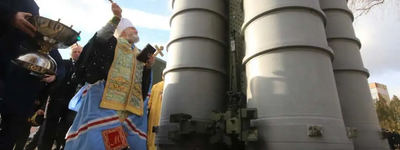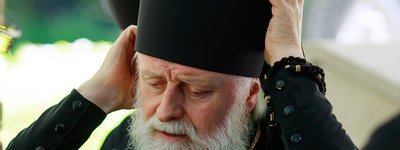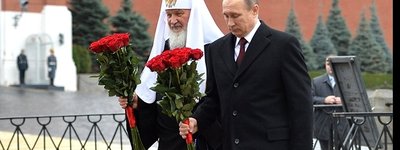Unrighteousness from Reinsurance
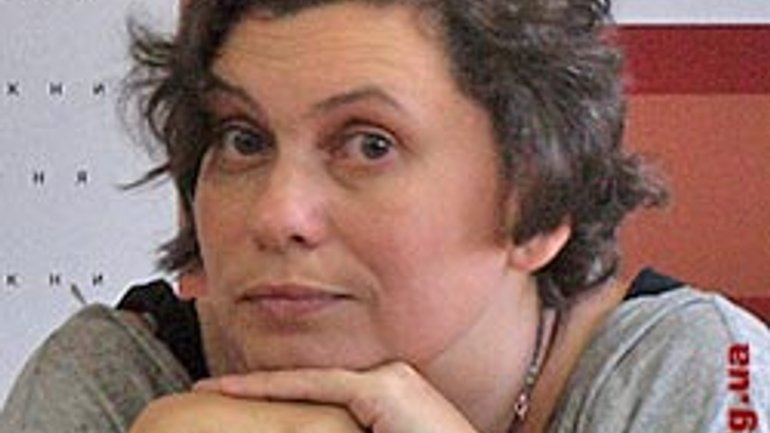
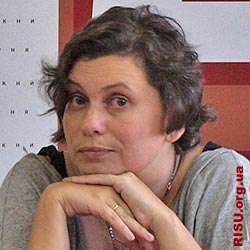 Another Maidan became another test of the maturity of the Ukrainian churches, and, as usual, a test for the Ukrainian Orthodox Church (UOC), which once again found itself in a difficult position. It’s no surprise. It is its believers who are regulars at the religious processions against Eurosodom. The church is part of the “spiritual fortification of the Russian World.” Our government ostentatiously displays its close relationship with its bishops. And few high-ranking officials are not knights of some order of the UOC.
Another Maidan became another test of the maturity of the Ukrainian churches, and, as usual, a test for the Ukrainian Orthodox Church (UOC), which once again found itself in a difficult position. It’s no surprise. It is its believers who are regulars at the religious processions against Eurosodom. The church is part of the “spiritual fortification of the Russian World.” Our government ostentatiously displays its close relationship with its bishops. And few high-ranking officials are not knights of some order of the UOC.
It is not surprisingly that it feels pressure from both sides – and from inside and from outside. And nothing is surprising about the fact that it must always distance itself and justify itself. There is no consensus in the UOC on European integration and the protests – just as there is none in the Ukrainian society. Some clerics openly support the protests, hold prayer sessions on Maidan, others believe that we should all go home and leave everything as it is, others openly support the government. For all the reasons – from high Christian arguments about “peace at any price” and “unity” to the usual financial debt.
Relations between the church and society, the authority and cooperation, pastoral work and solidarity – these are the challenges facing every Ukrainian church. But in the context of the UOC they acquire exceptional drama.
The cornerstone here, as it is for all others, is the choice of allies. The UOC, unlike other Ukrainian churches, in recent years has integrated with the government and big business (now it's almost the same thing) deeper than others. In general, other Ukrainian churches acquired these relationships as well. Their relationships with our “elite” are not very strong, but the reason is not always the moderation of the clergy, but that the elite chose “competitors.” For these churches, Maidan has become a moment of truth, which clearly divided the government and society – and their choice in favor of the society looks clear and completely natural, especially since if their congregations do not embrace the ideas of European integration at least they do not find them disgusting.
Another thing about the UOC: It worked so long to instill the concept of the Russian World in the minds of the flock, was so scared of “Eurosodom,” for so long said that salvation from schisms, Catholic proselytism, and other scary things could be found only in a union with Moscow, could not but nurture the flock, which sincerely believes this.
But this is only part of the trouble. The trouble lies in the fact that not the entire flock believes this. A large part of it is not against autonomy, European integration, unification with the “schismatics,” worship in the Ukrainian language, and so on. The UOC has two sides. Its cautious statements, attempts to stay above the fray, and the inconsistencies in the positions of the hierarchy should be considered in the context of its own internal contradictions.
The UOC, quite naturally, is afraid of the confrontation of ideologies within the church. The main theme of “non-interference” is the distinct moods among the parishioners in their attitudes toward European integration as well as toward the protests. This is all hanging on by a thread. The church with all of its might denies ideologies like the ones in conjunction with church life. Any attempt to talk about this is labeled by the Synod as “political Orthodoxy.”
It was a necessary step. The use of Orthodoxy and the church for political purposes in Ukraine was widespread and had catastrophic consequences. The Synod’s decision led to the significant lowering of the ideological degree, to ostentatiously punish particularly zealous “Orthodox brothers” and further distance itself from various “religious processions” with political slogans. These “religious processions” were based in the Kyiv Cave Monatsery, “brothers” and “religious-banner holders” enjoyed the sympathy of the Moscow Orthodox leadership, odious Ukrainian “political Orthodox” who are ignored in Kyiv, received the patriarch’s awards in Moscow, and the patriarch himself, the head of our church and political figure, regularly visits our community, and never forgets to remind us of the “brotherly nations,” “geopolitical catastrophe,” and “civilizational choice.” The situation is slightly schizoid, but it still allows the UOC to maintain the delicate balance within.
It was for this reason that the UOC officially declared that it would stay out of politics. It became a victim of its own security measures.
The church is not free from politics to the same extent that the society is not free from it – do not the bishops constantly mention this? The separation of society from politics leads to, as we have seen with our eyes, a crisis – the ruling class cannot, the people don’t want it, the former doesn’t care about the latter, the latter despises and hates the former. The separation of the church and society will lead to a loss of guidance and authority from both sides. The ranks should be fortified, not divided. We must be free not from politics but from speculation and politicking.
And didn’t the UOC cross the boundary that it set for itself when it signed a statement in support of European integration? Yes, everyone knows that it was asked to do so by people who are “very hard to refuse.” But what has been done is done. And now the signature on the document is binding to something. Why did the bishops only now remember that “not our whole flock supports European integration”? Did they decide only now that it matters? Because “the people who are very hard to refuse” once again changed their “vector”?
In their speeches the UOC representatives look just as “consistent” in their words and actions as our president. Their pious speeches on “so there will be no war” look, to say the least, inappropriate since on Maidan and near the Presidential Administration blood was shed and unprecedented cruelty was displayed. The fact that our authorities are believers of the UOC plays a significant role. This is known throughout the country. Therefore, an unambiguous assessment of the behavior of the government was expected. The government, and not “the police and protesters who beat one another.” It is extremely obvious who gave the order and which side has the power. The UOC could have reminded its high-ranking parishioners that their lies, hopeless and cynical lies, that so enraged the people and made them take to the street is, to put it mildly, not comme il faut.
But the official spokespersons of the UOC preferred to give pointless and vague speeches to “both sides,” which boil down to the fact that “they should remain calm” and “something will work out.” They ostensibly don’t care that they hide the same lies and justify violence. Remaining silent and not giving any assessments in some cases is even worse than saying something odious. Who would have thought that the statement of Bishop Pavlo Lebed on the paid protests would be perceived with more understanding than the toothless official statements? One cannot ignore someone who expresses a position – whatever it may be. No one is interested in those without positions. There is nothing to talk to them about.
And no, we are not talking about politics, ideology, or other terrible things. No one is calling on the church to support or not support European integration or so-and-so’s political party. The political positions of our clergy might well remain private. Like our own positions. We are talking about a moral assessment. In this case, it would seem that the church holds all the cards – it may be the last institution in our society, which has the tools to separate the wheat from the chaff, black from white, lies from the truth, good from evil. We have a right to expect an assessment from it. The so-called authority of the church in our society rests only on this hope. We are not waiting for its interjections of support and proscription lists. We are asking for the truth. What the church could do for the society these days is not allow any lies, even if it is a so-called holy lie.
One doesn’t need to go into the political intricacies or have a deep passion for Europe to immediately sense the government’s straight-out lie about European integration – especially now that the lie is in its final form after “proffesor” Yanukovych’s visit to Russia. And there is no need to substitute concepts – which is the same lie – no need to say that on Maidan people are there to support “European integration.” Because on Maidan people are taking a stand against the government’s lies. The next lie that broke our patient nation’s back. But to recognize the true nature of this protest is to recognize that a Christian’s place is found there.
But it is difficult and can have dire consequences. For the church, as well as the government, it is convenient to keep people “in obedience,” which for some reason is often not obedience but humility. After all, a lot of “traditional values” will crack the size of the Grand Canyon if human dignity is perceived as the main spiritual value of Christianity.
So instead of clear assessments of the actions of both sides we have vague mutterings about “peace at any price,” “preserve peace,” “the government from God,” “how can this be done during the fast?” “look at yourself,” etc. No, it is certainly important – “to start with yourself.” But in this context, this advice is a veiled appeal to go home and not make a fuss.
It could be recalled that “peace at any price” was not an end in itself in Christianity. To avoid blood, it was enough for the Christian martyrs to pretend that they abandoned their “misconceptions.” Confrontation should have been avoided – and everything would have ended with no ugly violence. But they took the risk knowing the likely outcome. I in no way equate political opposition to the confession of faith. I’m not even comparing them. I just want to remind you that Christianity does not by default mean there will be no conflict with what you think is true. Rather the opposite.
Now the churches have a great chance to be for the society what they promised the last twenty years to be – a moral authority. Not an abstract one. Not a potential one. But a practical and crucial one. One that that has a grasp on the issues of good and evil. That will give a clear and unambiguous assessment of every word and deed. It will help to close the ranks around the truth. Everything that is needed for this – to be with the people and always insist on truth. Concerning the politicians and diplomats, black and white blends in shades of gray. The church cannot allow this. Just as we cannot. Maidan for us all is a great chance to find our place among our own kind. It is no coincidence that the clergy of the UOC is so polarized in their attitudes toward the events. This is a good sign. It means that along with those who are satisfied or who are afraid, who try to keep things as they are in the UOC there are people who are looking for ways out of the situation of non-interference, which is a stalemate for the UOC. They are looking for an opportunity to become something and someone for people who are trying to become different. Who are trying to become better. Who need help with this.





